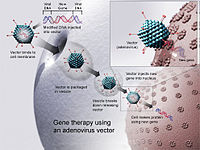
Photo from wikipedia
The lung has long been a target for gene therapy, yet efficient delivery and phenotypic disease correction has remained challenging. While there have been significant advancements in gene therapies of… Click to show full abstract
The lung has long been a target for gene therapy, yet efficient delivery and phenotypic disease correction has remained challenging. While there have been significant advancements in gene therapies of other organs, including the development of several ex vivo therapies, in vivo therapeutics of the lung have been slower to transition to the clinic. Within the past few years, the field has witnessed an explosion in the development of new gene addition and gene editing strategies for the treatment monogenic disorders. In this review, we will summarize current developments in gene therapy for cystic fibrosis, alpha-1 antitrypsin deficiency, and surfactant protein deficiencies. We will explore the different gene addition and gene editing strategies under investigation and review the challenges of delivery to the lung.
Journal Title: Human gene therapy
Year Published: 2020
Link to full text (if available)
Share on Social Media: Sign Up to like & get
recommendations!